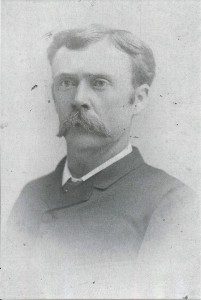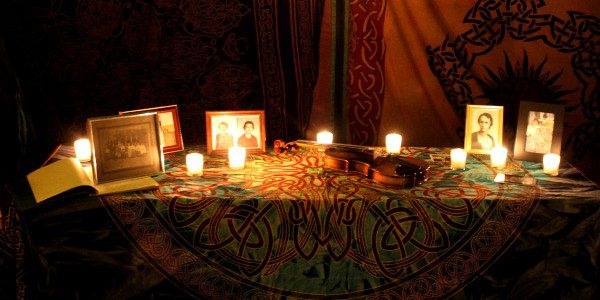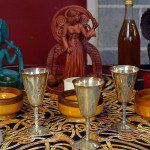
If you’re looking for the foundations of most polytheist religions, you don’t have to dig very far before you run into ancestors. Ancestor veneration doesn’t require special revelation – it comes intuitively even to committed atheists and monotheists. Go into many homes and you’ll see pictures of grandparents on the wall, collections of mementos that could properly be called a shrine, and perhaps even family trees and histories.
Who are our ancestors? Some we knew in this life, some we know only their names and dates of birth and death, and some we don’t know at all. But no matter how close or distant we are from our ancestors, they answer the question “where do we come from?” We look at old pictures and we see the some of the same features we see in the mirror. We share a name or we hear a tale and realize that could have been us. We do a bit of genealogical research and we find roots in a faraway land – and sometimes living relatives too. All that reminds us that we’re not alone in this world.
That’s enough information that the impossible answers to where we ultimately came from are less troubling. If you know you came from your parents and grandparents, and they came from their parents and grandparents, and a long time ago some of them came from Ireland and Scotland, and who knows how long they had been there, that’s enough ancestors to keep you busy remembering and honoring.
There’s value in exploring the unanswerable question of the origins of life and the universe – I’m going to blog on that sometime soon. But if you’re grounded in the recent past, the blurriness of the distant past becomes less and less troubling.
It is good and right that we honor our ancestors. It’s only because of them that we’re even here, much less that we have things like religion, culture, art, and the infrastructure that supports our lives. We can’t pay them back, but we can thank them, we can remember them, and we can strive to be good ancestors for those who come after us.
Our ancestors’ gifts continue long after they leave this world. They provide inspiration. We know that whatever hard times we’re going through, we have an ancestor who went through something just as bad or worse. We know they got through it or we quite literally wouldn’t be here. They faced famine and disease, invasion and war, plagues and ice ages. They moved – the story of humanity is the story of migration. I’m sure some of that migration was out of curiosity and adventure, but I’m just as sure more of it was due to dwindling food supplies or violent attacks. They did what they had to do, and so can we.
Our ancestors are our spiritual allies. It’s great to work with Gods and with local spirits, but their goals and our goals don’t always align. Our ancestors are spiritual beings who have a personal interest in seeing that we survive and succeed. They’re usually accessible – and willing to help – when other spirits may not be.
Our experiences of our ancestors point toward an Otherworld. If someone you knew well has died, you’ve almost certainly dreamed of them. Is this simply your subconscious remixing your memories? Sometimes. But dreams remind us that our relationship hasn’t ended – it’s just changed forms.
And then there are those experiences of ancestors (sometimes spiritual, sometimes tangible) that are more than dreams, that are so real we can’t ignore them. They do not “prove” the existence of life after death (much less what form that afterlife takes) but they point us in that direction.
Our contemporary families are more complicated than strict bloodlines. We have adopted families, blended families, and chosen families. Sometimes we use different vocabulary, but it’s always been this way, with marriages, fosterage, and associations so tight they were called brotherhoods and sisterhoods. Those who came before us in these relationships are our ancestors too, and they are as deserving of our honor as our ancestors of blood.
Ancestor veneration and even ancestor worship is not polytheism – our ancestors are not Gods. A few ancestors become Gods, but that’s a different post for a different time. Likewise, polytheism does not require ancestor veneration… though few if any forms of polytheism ignore it. But ancestors and Gods are both spiritual beings, and the multiplicity of ancestors points toward the multiplicity of the Gods. Our intuitive impulse to honor our ancestors points toward the need to honor the Gods. Our recognition of the gifts of our ancestors helps us recognize the gifts of the Gods.
My polytheism rests on a foundation of mighty ancestors.
Ancestors of blood and ancestors of spirit, you whose children we are and on whose foundations we build, because of you we have life. We thank you for the legacy you left us, and we thank you for your continued presence and blessings in our lives. May our devotions serve to renew and strengthen our connections across many generations and many realms of existence, and may we live so as to be welcomed into your presence when our mortal lives are done. Hail the mighty ancestors!


















